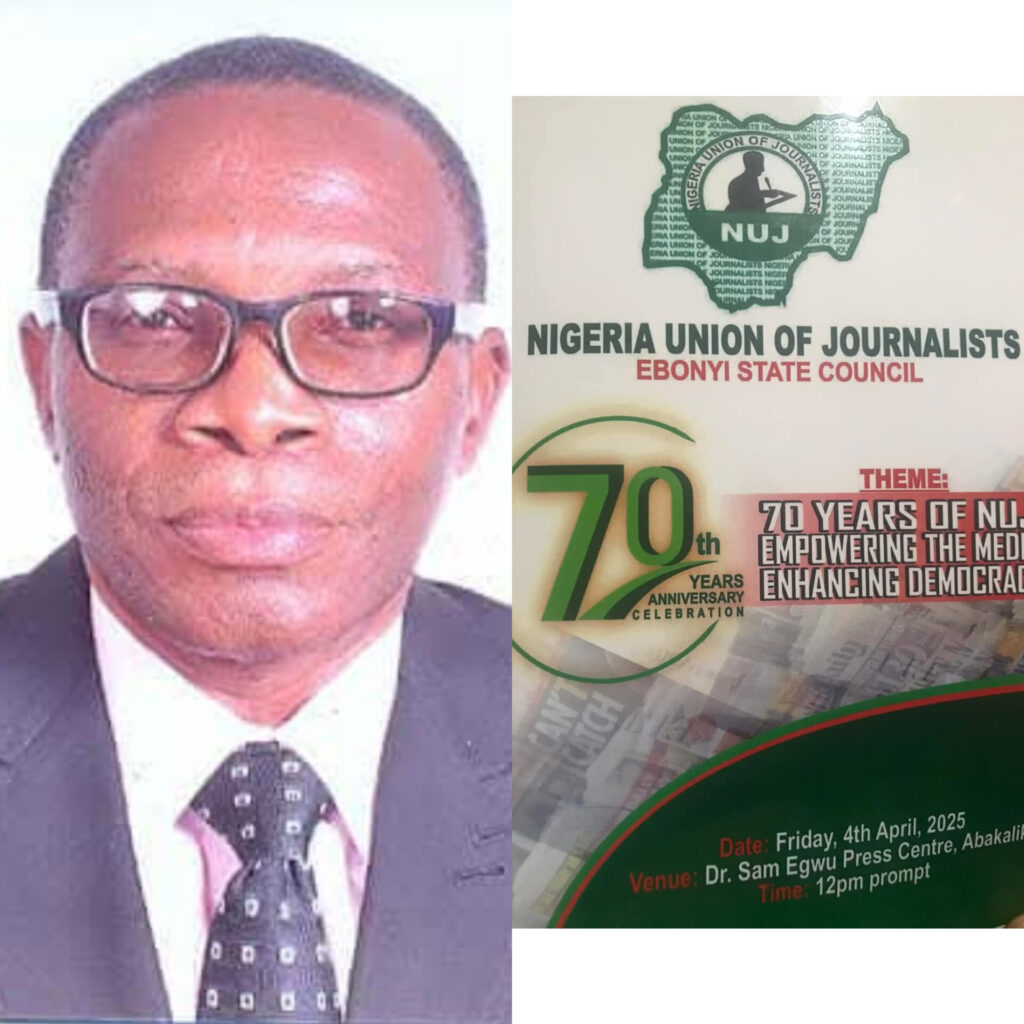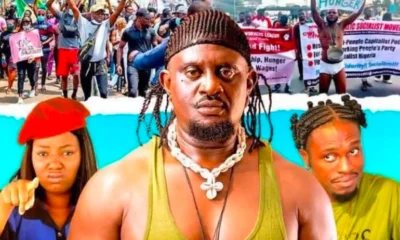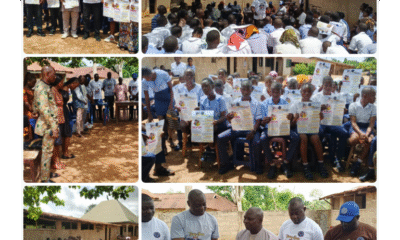NEWS
NUJ Celebrates 70 Years, Calls for Stronger Press Freedom

The Nigeria Union of Journalists (NUJ) have celebrated its 70th anniversary, with a call for stronger press freedom and improved safety for journalists.
Speaking at the occasion, Dr. Joseph N. Chukwu, Head of Department of Mass Communication at Alex Ekwueme Federal University, said the union has played a pivotal role in promoting press freedom, professional development, and welfare initiatives for journalists.
However, Dr. Chukwu noted that the union has faced internal governance challenges, media regulation issues, and the impact of socio-political factors on journalistic freedoms.
“The NUJ has confronted numerous adversaries over the year , Governments and Censorship, Media Moguls and Corporate Greed”
He noted that , “Tech Giants: Social media platforms like Facebook and Google have decimated traditional news revenue while spreading misinformation,Police and State, Spying on journalists”.
“The NUJ continues to fight against these forces, advocating for media pluralism, fair pay, and editorial independence” he added.
He expressed concern over the safety of journalists, citing estimates that dozens have lost their lives in the line of duty.
Dr. Chukwu called for improved measures to protect journalists and ensure impunity for crimes against them.
The NUJ’s anniversary celebration comes as the union faces new challenges, including the impact of artificial intelligence on journalism, declining trust in media, and freelance exploitation.
“By 2054, artificial intelligence will have reshaped journalism. AI-generated articles, deepfake videos, and automated news aggregation could displace human reporters, particularly in routine news coverage.
Dr. Chukwu emphasized the need for the union to adapt to digital disruption while holding power to account.
He called for stronger regulation of tech giants, improved working conditions for journalists, and increased support for press freedom.
SEE FULL TEXT
THE NIGERIA UNION OF JOURNALISTS AT 70 YEARS: YESTERDAY, TODAY AND TOMORROW
BEING TEXT OF SPEECH DELIVERED BY DR. JOSEPH N. CHUKWU, HEAD OF DEPARTMENT OF MASS COMMUNICATION, ALEX EKWUEME FEDERAL UNIVERSITY, NDUFU-ALIKE, EBONYI STATE ON THE OCCASION OF THE CELEBRATION OF 70TH ANNIVERSARY OF THE NIGERIA UNION OF JOURNA;ISTS, NUJ, AT THE SAM EGWU PRESS CENTRE, ABAKALIKI, EBONYI STATE ON FRIDAY, APRIL 4, 2025
PROTOCOL
Preamble
The Nigerian Union of Journalists (NUJ) has played a pivotal role in the landscape of journalism and media practice in Nigeria since its establishment in 1955. As the organization celebrates its 70th anniversary, it is essential to reflect on its achievements and challenges. This article examines the Union’s historical context, key milestones, and contributions to media advocacy, professional development, and social justice, while also addressing its drawbacks, including issues of internal governance, media regulation, and the impact of socio-political factors on journalistic freedoms.
The Nigerian Union of Journalists (NUJ) was founded in 1955 to promote the welfare of journalists and ensure the practice of journalism in Nigeria remained professional and ethical. Over the past seven decades, the NUJ has evolved into a cornerstone for media professionals in Nigeria, advocating for freedom of the press, workers’ rights, and democratic governance (Ayeni, 2015). As we celebrate its 70 years of existence, it is imperative to assess both the achievements and the challenges that have shaped the Union’s journey.
Historical Context
The formation of the NUJ can be traced back to the post-colonial era when Nigerian journalists sought to unify their voices for better recognition and rights within the profession. Its inception followed the establishment of various newspapers and media organizations during Nigeria’s struggle for independence from British colonial rule. This period marked the beginning of significant journalism in Nigeria, characterized by robust reporting on socio-political issues and advocacy for national development (Nwosu & Udeze, 2019).
Achievements of the NUJ
1. Advocacy for Press Freedom
One of the foremost accomplishments of the NUJ has been its continuous advocacy for press freedom. The Union has stood against government censorship and has championed the cause of journalists who faced persecution for their work. For instance, during the military regimes in Nigeria, the NUJ was instrumental in mobilizing support for the restoration of democracy and the protection of journalistic rights (Ogunyemi, 2020).
2. Professional Development
The NUJ has taken significant steps to enhance the professionalism of journalism in Nigeria. It has organized numerous training workshops, seminars, and conferences aimed at improving the skills and competencies of journalists. Through collaborations with international bodies and local institutions, the Union has fostered capacity-building initiatives that equip journalists with the necessary knowledge to navigate the complexities of modern journalism (Essien, 2021).
3. Welfare Initiatives
Recognizing the challenging working conditions faced by journalists, the NUJ has implemented welfare programmes to support its members. These programmes include health insurance schemes, pension plans, and financial support for members in distress. This focus on welfare highlights the Union’s commitment to safeguarding the interests of its members (Ogude, 2022).
4. Promoting Gender Equality in Journalism
In recent years, the NUJ has made concerted efforts to promote gender equality within the profession. The establishment of the NUJ Women’s Wing, National Association of Women Journalists (NAWOJ), has been crucial in addressing challenges faced by female journalists and ensuring their voices are heard within the Union and the broader media landscape (Egbu, 2023).
Drawbacks of the NUJ
1. Internal Governance Challenges
Despite its achievements, the NUJ has faced criticisms regarding its internal governance structure. Allegations of corruption, lack of transparency, and factionalism have plagued the Union, undermining its credibility and effectiveness (Akanji, 2022). The challenges have occasionally led to divisions within the Union, detracting from its ability to present a united front on critical issues affecting journalists.
2. Media Regulation and Government Pressure
The NUJ operates in an environment where the media is often subject to government regulation and pressure. Laws such as the Cyber Crime Act and the National Broadcasting Commission (NBC) regulations have sometimes stifled journalistic freedom and creativity (Ibrahim, 2021). While the NUJ has advocated for the repeal of restrictive laws, the ongoing struggle indicates the persistent challenges associated with media regulation.
3. Impact of Socio-Political Factors
The political landscape in Nigeria has a significant impact on the media environment. Issues such as insecurity, violence against journalists, and the threats posed by non-state actors have exacerbated the difficulties faced by journalists (Kperogi, 2022). The NUJ has had to grapple with protecting its members in an increasingly hostile environment, often with limited resources.
4. Safety Challenges
Over the last seventy years, the safety of journalists in Nigeria has been of significant concern due to various forms of violence, including extrajudicial killings, targeted attacks, and general insecurity.
While it’s challenging to provide an exact number of journalists who have lost their lives in the course of duty, estimates suggest that dozens have been killed, particularly in the context of conflicts, political instability, and heightened security crises.
However, taking a Global Impunity Index, some organizations like the Committee to Protect Journalists (CPJ), Nigeria is often listed among countries with the highest rates of impunity for crimes against journalists. The CPJ’s records indicate that:
– Between 1992 and 2023, several journalists have been murdered in Nigeria, often without the perpetrators being brought to justice.
– Notable cases include the assassination of journalist Dele Giwa on October 19, 1986 by a letter bomb and the killings during the Boko Haram insurgency, where several journalists were targeted while covering the conflict.
Other reports from local and international human rights organizations have documented journalists’ deaths in Nigeria, particularly during periods of significant political unrest, such as during the military dictatorships and in recent years amidst rising security challenges.
Significance of Journalists’ Deaths
1. Press Freedom and Democracy: The deaths of journalists can undermine press freedom and democracy. A free press is essential for a robust democracy, providing checks on power and fostering public discourse. High-profile killings tend to instill fear among journalists, leading to self-censorship and a chilling effect on reporting.
2. Human Rights Concerns: The violence against journalists highlights broader human rights issues within Nigeria. It signals the lack of accountability and rule of law, where crimes against individuals, including those in the media, often go uninvestigated and unpunished.
3. Public Awareness and Safety: The dangerous environment for journalists has raised awareness globally about the safety of reporters, prompting calls for better protections and international advocacy for press freedom. It also brings focus to the need for protective measures and policies that safeguard journalists in conflict zones.
4. International Community Response: The situation has led to increased scrutiny from the international community, with calls for action from organizations like the United Nations and various press freedom groups.
Victims, Villains and Heroes of NUJ at 70
Over the past seven decades, members of the Nigeria Union of Journalists (NUJ) have witness – and fought against – press freedom violations, corporate greed, political interference, and attacks on journalists. In the process the journalistic landscape is filled with victims (journalists silenced or harmed), villains (those who undermine press freedom), and heroes (those who defend truth and accountability).
Victims: Journalists Under Threat
Journalists have faced increasing dangers, both physical and legal:
– Physical Attacks and Intimidation: From war correspondents to local reporters, NUJ members have been assaulted, arrested, or even killed for their work.
– Legal Harassment: SLAPPs (Strategic Lawsuits Against Public Participation) and defamation lawsuits are used to silence investigative journalists.
A Strategic Lawsuit Against Public Participation (SLAPP) is a legal action taken against individuals or organizations with the intent to silence, intimidate, or harass them for exercising their free speech rights, particularly in relation to public issues. SLAPPs are often filed by corporations, government entities, or other powerful interests against critics, activists, journalists, or community members who speak out on matters of public concern, such as environmental issues, social justice, or political matters.
The underlying motivations for SLAPPs typically include:
1. Intimidation: The lawsuit serves to intimidate the defendant, discouraging them from speaking out or engaging in activism by imposing the burden of legal defense.
2. Chilling Effect: The threat of a SLAPP can create a chilling effect on free speech, as others may be deterred from voicing their opinions or participating in public discourse out of fear of similar legal repercussions.
3. Resource Drain: Defending against a lawsuit can be costly and time-consuming, potentially draining resources and diverting attention from advocacy or activism efforts.
4. Reputation Management: By filing a SLAPP, the plaintiff may seek to damage the reputation of the defendant or undermine their credibility in the eyes of the public.
In response to the prevalence of SLAPPs, many jurisdictions have enacted anti-SLAPP laws designed to provide protections for individuals and organizations targeted by such lawsuits.
These laws typically allow defendants to quickly dismiss SLAPPs and can also provide for the recovery of legal fees and other costs associated with defending against the lawsuit. The goal of these anti-SLAPP measures is to safeguard free speech and encourage public participation in important societal discussions.
– Job Insecurity: Mass layoffs in traditional media, precarious freelance work, and the decline of local journalism have left many journalists vulnerable.
The NUJ has campaigned for better protections, including safety training, legal support, and stronger whistleblower laws.
Villains: Threats to Press Freedom
The NUJ has confronted numerous adversaries over the year
– Governments and Censorship.
– Media Moguls and Corporate Greed.
– Tech Giants: Social media platforms like Facebook and Google have decimated traditional news revenue while spreading misinformation.
– Police and State Surveillance: Spying on journalists.
The NUJ continues to fight against these forces, advocating for media pluralism, fair pay, and editorial independence.
Heroes: Defenders of Journalism
Despite the challenges, the NUJ has celebrated many victories:
– Whistleblowers and Investigative Journalists: Those who exposed scandals like certificate forgery, corruption, often at great personal risk.
– Union Activists: NUJ members who have organized strikes to resist layoffs and defend quality journalism.
– Campaigners for Press Freedom: The NUJ’s legal challenges against surveillance laws and its support for jailed journalists worldwide.
– Local Journalists: Often unsung heroes keeping communities informed despite shrinking resources.
The union itself is a hero, providing solidarity, training, and advocacy for journalists in an increasingly hostile media landscape.
The Future: NUJ’s Next Battle
As the NUJ turns 70, it faces new threats:
– Artificial Intelligence (AI) and Automation: Will algorithms replace journalists? The NUJ is pushing for ethical AI use.
– Declining Trust in Media: Rebuilding public confidence through transparency and accountability.
– Freelance Exploitation: Fighting for fair pay and contracts in the gig economy.
NUJ at 70: What Future in the Next Century?
As the Nigeria Union of Journalists (NUJ) marks its 70th anniversary amidst the euphoria and rambunctious noise of celebration, it stands at crossroads.
The media landscape has transformed dramatically since its founding – from print dominance to digital disruption, from trusted newsrooms to algorithm-driven misinformation.
What will the NUJ look like at 100 years old? Will it remain a vital defender of press freedom, or will technological, political, and economic forces weaken and swallow its influence?
1. The Challenges Ahead
A. The AI Revolution and Automation
By 2054, artificial intelligence will have reshaped journalism. AI-generated articles, deepfake videos, and automated news aggregation could **displace human reporters**, particularly in routine news coverage. The NUJ must:
– Fight for ethical AI use – ensuring transparency in automated journalism.
– Demand protections against AI replacing jobs without fair compensation.
– Push for copyright reforms to prevent tech giants from exploiting journalists’work without payment.
B. The Decline of Traditional Media
Print newspapers may be nearly extinct by 2054, and even digital outlets face financial instability due to collapsing ad revenues and predatory tech platforms. The NUJ will need to:
– Support alternative funding models (e.g., cooperatives, nonprofit journalism).
– Campaign for stronger regulation of Google and Meta to ensure fair revenue sharing.
– Defend public service broadcasting against political interference.
C. Press Freedom Under Siege
Governments worldwide are increasing criminalizing journalism, with surveillance laws, SLAPPs, and even physical threats.
The NUJ must:
– Expand legal defence funds for journalists facing persecution.
– Lobby for stronger whistleblower protections.
– Build global solidarity networks with unions like the IFJ (International Federation of Journalists).
D. The Crisis of Trust
Public skepticism toward media is at an all-time high. The NUJ must lead efforts to rebuild trust** by:
– Promoting media literacy programs.
– Enforcing stricter ethical guidelines to combat sensationalism and bias.
– Encouraging transparency in reporting processes.
2. The NUJ’s Future Role
A. From Union to Movement
The NUJ can no longer just be a trade union – must become a movement for media democracy. This means:
– Organizing beyond traditional newsrooms(e.g., freelancers, podcasters, citizen journalists).
– Advocating for policy changes (e.g., breaking up media monopolies, taxing tech giants).
– Leading public campaigns against disinformation and for press freedom.
B. A Global Defender of Journalism
With authoritarianism rising, the NUJ must strengthen international alliances, such as:
– Supporting exiled journalists fleeing persecution.
– Pressuring governments to uphold press freedom.
– Exposing corporate censorship (e.g., tech platforms suppressing critical reporting).
C. Reinventing Journalism for the Next Generation
Young journalists face precarious work, low pay, and burnout. The NUJ must:
– Push for fair wages in digital media.
– Provide training in emerging skills (AI, data journalism, cyber security).
– Fight for mental health support in high-stress reporting environments.
3. A Vision for NUJ at 100
By 2054, the NUJ could be:
✅A global leader in press freedom advocacy.
✅A pioneer in ethical AI journalism.
✅A powerful force ensuring journalism remains a viable, respected profession.
Or, if it fails to adapt:
❌ A weakened organization, outpaced by tech monopolies and authoritarian regimes.**
❌ A relic of the past, unable to protect journalists in a fragmented media world.
Conclusion: Will the NUJ Survive the Next 30 Years?
The NUJ’s future depends on its ability to evolve with technology, defend press freedom, and unite journalists worldwide**. If it embraces innovation while staying true to its core mission – protecting truth-tellers and holding power to account – it will not only survive but thrive as it turns 100.
The next three decades will test the NUJ like never before. But if history is any guide, this union has never backed down from a fight. **The battle for journalism’s future is just beginning.
Final Thought
The NUJ at 100 must be more than a union – it must be a shield for truth in a world drowning in lies.”
The NUJ’s legacy is one of resistance and resilience – whether against tycoons, governments, or tech giants. Its next chapter will be defined by how it adapts to digital disruption while holding power to account.
In summary, in 70 years, the NUJ has been a shield for journalists and a sword against corruption. The fight continues – because without fearless journalism, democracy dies in darkness.
Thank you for your kind attention.
Discover more from Asiwaju Media
Subscribe to get the latest posts sent to your email.
-

 TECH5 days ago
TECH5 days agoFG Launches TVET Initiative To Empower Nigerian Youth With Industry-Relevant Skills
-

 EDITORIAL6 days ago
EDITORIAL6 days agoVery Dark Black Man” and the Erosion of Artistic Ethics in Nollywood
-

 NEWS5 days ago
NEWS5 days agoTragedy Strikes as 20 Kano Contingent Members Die in Fatal Crash After National Sports Festival
-

 NEWS2 days ago
NEWS2 days ago2025 C-SAGAS Arts and Sciences Competition Officially Flagged Off in Ebonyi State
-

 ENTERTAINMENT7 days ago
ENTERTAINMENT7 days agoMixed Reactions Erupt on Social Media Over Nollywood Film Inspired by Activist Verydarkman
-

 ENTERTAINMENT3 days ago
ENTERTAINMENT3 days agoAngela Okorie Appears To Shade Destiny Etiko After Wedding Drama
-

 CAMPUS REPORTS5 days ago
CAMPUS REPORTS5 days agoCall for Applications: One Young World Leading Scholarship 2025 ( Fully Sponsored Trip to Summit in Munich, Germany)
-

 NEWS6 days ago
NEWS6 days agoPolice Arrest OPC Member for Allegedly Killing of Teenager in Lagos
-

 NEWS6 days ago
NEWS6 days agoOne Feared Dead, Several Injured as Billboard Collapses in Aba During Heavy Rain
-

 ENTERTAINMENT4 days ago
ENTERTAINMENT4 days agoCardi B to Offset: “I Want You to Die Slow” Amid Spousal Support Drama
-

 NEWS5 days ago
NEWS5 days agoOver 100 Feared Dead, Dozens Missing As Flood Devastates Mokwa In Niger State
-

 SPORTS6 days ago
SPORTS6 days agoTrent Alexander-Arnold Joins Real Madrid On Free Transfer After Leaving Liverpool
















